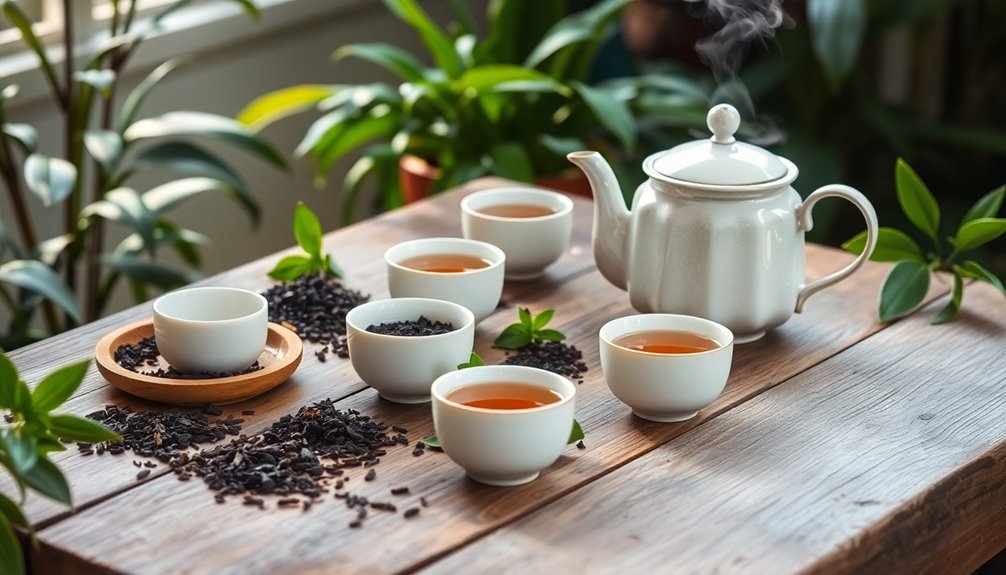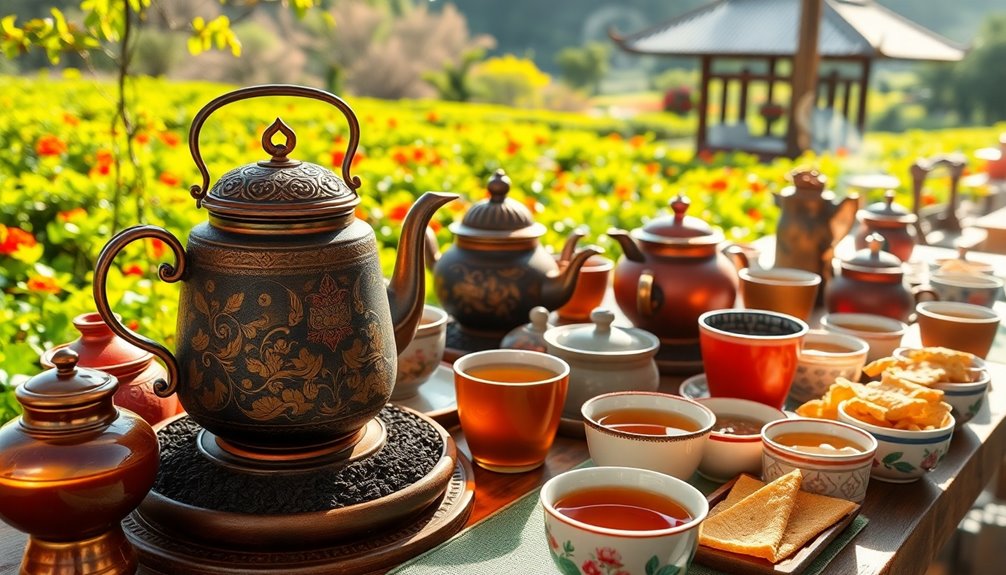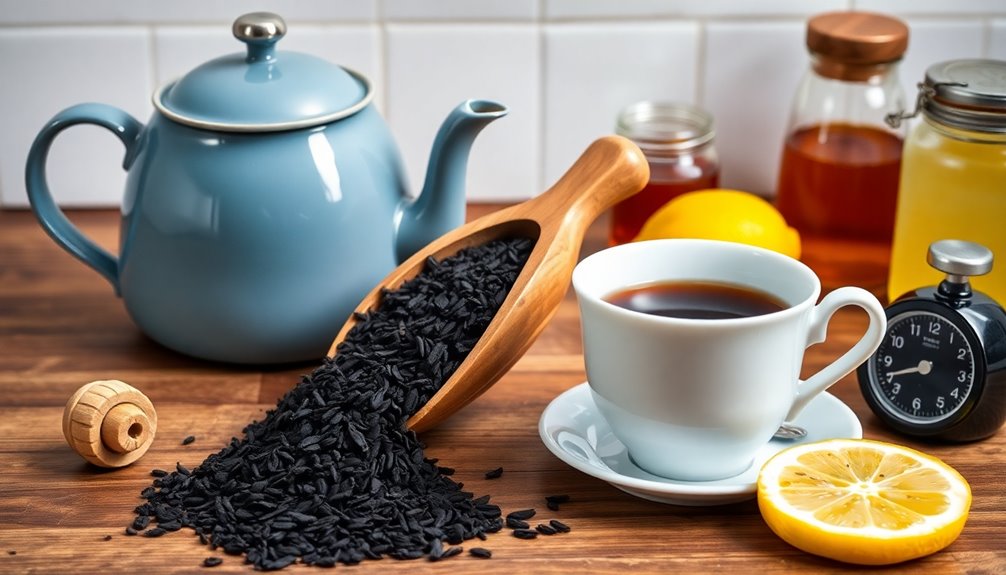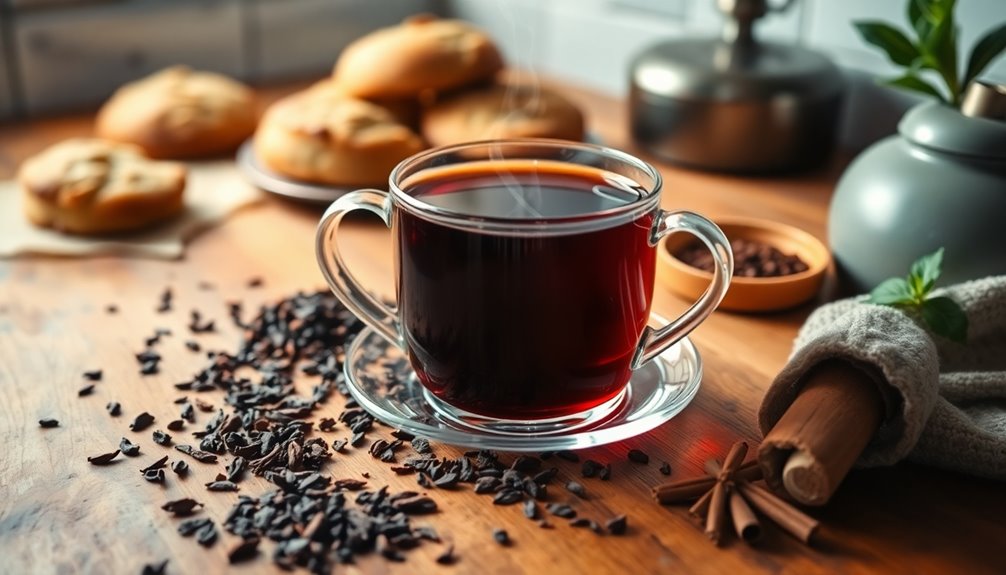Exploring black teas is like going on a flavor adventure! You can try Assam with its robust, malty taste, perfect for a strong cup. Then there's Darjeeling, which offers delicate floral notes, often called the "Champagne of Teas." If you enjoy bright flavors, Ceylon black tea brings citrusy goodness, while Keemun features a complex sweetness with a hint of smokiness. For something bold, Lapsang Souchong is the way to go, with its unique smoky profile. Pair your favorite tea with delicious foods for a delightful experience. Stick around, and you'll discover even more about these amazing teas!
Key Takeaways
- Assam tea is robust and malty, making it ideal for strong breakfast blends and energizing brews.
- Darjeeling tea offers delicate floral notes, varying between first and second flush harvests, often enjoyed with lighter fare.
- Ceylon black tea features bright, citrusy flavors that can balance spicy dishes, particularly suited for Sri Lankan cuisine.
- Keemun tea is known for its complex sweetness and subtle smoky notes, often enjoyed without milk and pairs well with roasted meats.
- Lapsang Souchong is famous for its bold, smoky profile, complementing barbecued dishes and game meats for a delicious contrast.
Introduction

When it comes to exploring black teas, you'll find a world of flavor just waiting to be uncovered. Black teas come in many grades and flavor profiles, offering something for everyone. For example, Assam teas are known for their robust flavor, perfect for those who enjoy a strong cup.
On the other hand, Darjeeling teas often surprise you with their delicate floral notes, making them a favorite among those who appreciate a lighter taste.
The flavors you discover depend on several factors, including tea cultivation and processing methods. Different climates and altitudes influence how the tea plants grow, while the specific cultivars, like Camellia Sinensis var. Sinensis and var. Assamica, play a crucial role in flavor development.
You'll also find notable varieties like Ceylon black, which adds a citrusy brightness to your cup, and Lapsang Souchong, famous for its smoky flavor from pinewood smoking.
Tea's Cultural Significance Worldwide

Black tea weaves itself into the fabric of cultures around the world, shaping daily rituals and social interactions. This beloved beverage offers more than just a delightful flavor profile; it's a symbol of connection.
For instance, in Britain, the tradition of Afternoon tea brings friends and families together over cups of rich Assam tea, known for its malty flavor. Meanwhile, in Malaysia, you might enjoy a frothy Teh Tarik, a sweet blend of black tea with sugar and condensed milk. The unique steeping time for different black teas can greatly influence their flavor, making each experience distinct. In regions like Wisconsin's urban areas, foraging for wild edibles can further enrich culinary experiences. Additionally, various cultures incorporate decor masks into their rituals, much like how tea is used in social gatherings.
The cultural significance of black tea shines through in traditional tea ceremonies, like those in China and Japan. These ceremonies emphasize mindfulness and artistry, turning tea preparation into a cherished ritual, where the use of specific utensils(https://www.example.com) enhances the experience.
The history of black tea spans centuries, rooted in the tea trade that began in China during the Ming Dynasty. As tea growing spread globally, varieties like Darjeeling tea emerged, celebrated for its unique floral notes. The global tea market, valued at approximately $200 billion(https://www.example.com) in 2022, showcases the enduring popularity of black tea worldwide.
Whether you're sipping a robust cup in India or participating in a serene ceremony in Japan, black tea connects people across cultures, fostering friendships and creating lasting memories.
Flavor Intensity Varies by Region

The flavor intensity of black tea varies significantly based on its region of origin, adding to the complexity and richness of this beloved beverage. For instance, Assam black tea brings robust, malty flavors that make it perfect for energizing breakfast blends.
If you're looking for something lighter, Darjeeling is known as the "Champagne of Teas." Its floral taste profile changes between the first and second flush harvests, giving you a delightful experience each time.
Ceylon black tea from Sri Lanka offers a bright, citrusy flavor that can be slightly astringent or smooth, depending on the growing region and altitude.
If you enjoy deeper flavors, try Keemun black tea from China's Anhui Province. Its complex sweetness and subtle smoky notes enhance its flavor intensity wonderfully, often enjoyed without milk.
Speaking of smoky, Lapsang Souchong from Fujian Province is famous for its bold, smoky profile, created through traditional pinewood smoking techniques.
Each of these black teas showcases unique flavor profiles, making it exciting to explore different regions and discover how they influence your tea-drinking experience.
Regional Pairings With Cuisine

Exploring the harmonious relationship between black teas and cuisine reveals a world of delightful pairings that enhance both food and drink. Each type of black tea brings its own unique character, making it easier for you to find the perfect match for your meals.
For instance, Assam black tea, with its rich and malty flavor, pairs wonderfully with hearty breakfast dishes like eggs and bacon, enhancing those robust flavors.
On the other hand, Darjeeling black tea, known for its floral notes, complements lighter fare such as salads and seafood, letting the delicate flavors shine.
If you're enjoying spicy dishes, Ceylon black tea's bright and citrusy profile can balance the heat, especially in Sri Lankan cuisine.
For a richer experience, Keemun black tea, with its smoky and lightly floral taste, goes great with roasted meats and strong cheeses, as it accentuates their flavors beautifully.
Lastly, Lapsang Souchong, famous for its bold, smoky characteristics, is a fantastic choice with barbecued dishes and game meats, creating a delicious contrast.
Caffeine Content Debates

When it comes to caffeine content, many tea enthusiasts often find themselves debating the merits of black tea versus other varieties. Black teas generally contain higher caffeine levels, averaging 40-70 mg per 8-ounce cup. However, Assam black tea stands out for its robust flavor and can reach up to 110 mg per serving. This makes it one of the strongest black teas available!
Your brewing method and steeping time can significantly affect the caffeine content. For instance, broken leaves typically release more caffeine, so keep that in mind when choosing your tea. If you're looking for a milder energy boost without the jitters, black tea usually contains less caffeine than coffee, which averages around 95 mg per cup.
It's also important to consider your sensitivity to caffeine. Everyone reacts differently, and if you enjoy multiple cups throughout the day, you might want to monitor your intake.
Practical Applications

Understanding the unique flavor profiles of black teas can elevate your tea-drinking experience in countless ways.
When you choose black tea, consider Assam for its malty and brisk taste. It's perfect for energizing breakfast blends like English Breakfast tea.
If you're looking for something floral and fruity, reach for a first flush Darjeeling. It offers a light and delicate experience that can brighten your mornings.
Ceylon black tea is another versatile option. Its bright, balanced flavor can be enjoyed hot or iced, making it great for any season.
For a more complex taste, try Keemun black tea. This tea is known for its sweetness and lightly floral notes, so you may not even need milk!
If you crave something bold, Lapsang Souchong will impress you with its robust, smoky flavor. It's made from leaves that are traditionally smoked over pinewood, providing a unique experience for adventurous tea drinkers.
Frequently Asked Questions
What Is the Flavor Profile of Black Tea?
Black tea's flavor profile varies greatly. You'll find robust malty notes in Assam, delicate floral hints in Darjeeling, bright citrus in Ceylon, and bold smokiness in Lapsang Souchong, offering diverse tasting experiences for any palate.
What Are the Different Grades of Black Tea?
You'll find several grades of black tea, including Orange Pekoe, Broken Orange Pekoe, fannings, and dustings. Each grade varies in size and quality, affecting the flavor and strength you experience while brewing.
What Black Tea Has the Strongest Flavor?
If you're seeking a strong flavor in black tea, consider Lapsang Souchong for its intense smokiness or Assam for its robust malty notes. Both deliver bold experiences that satisfy your craving for a powerful tea.
How Many Types of Black Tea Are There?
There're thousands of black tea types, influenced by region and processing. You'll find major varieties like Assam and Darjeeling, each offering unique flavors. It's a vast world to explore, with countless options awaiting your discovery.
Conclusion
Now that you've explored the different flavor profiles of black teas, you can enjoy them even more! Remember, each tea has its own unique taste based on where it comes from. Don't be afraid to try them with different foods to find your favorite pairings. Whether you prefer strong Assam or smooth Darjeeling, there's a black tea out there for you. So, grab a cup, and start your flavorful tea adventure today!










